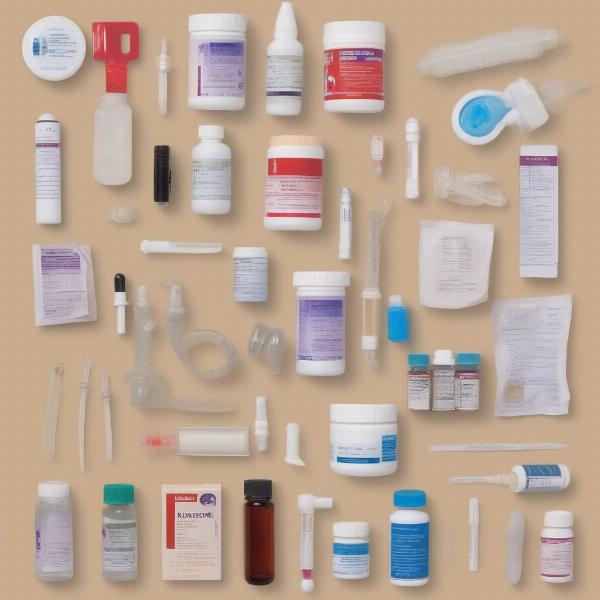Finding the strongest flea medicine for your dog can feel overwhelming with so many options available. You want the most effective treatment to protect your furry friend from these pesky parasites. This article will guide you through choosing the right flea medication, considering factors like your dog’s breed, age, health, and lifestyle. We’ll explore different types of flea treatments, discuss their effectiveness, and help you make an informed decision. Ultimately, the “strongest” flea medicine isn’t necessarily the one with the highest concentration of active ingredients, but rather the one that best suits your dog’s individual needs.
Understanding Flea Infestations and Their Impact
Fleas are more than just a nuisance; they can cause severe health problems for your dog. From intense itching and skin irritation to allergic reactions and even the transmission of diseases like tapeworms, fleas are a serious concern. Understanding the life cycle of fleas and how infestations occur is crucial in choosing the right preventative measures.
What makes a flea medicine “strong”? It’s not just about killing adult fleas, but also breaking the flea life cycle by targeting eggs, larvae, and pupae. A comprehensive approach is essential for long-term flea control and prevention.
Exploring Different Types of Flea Medications
There’s a wide range of flea medications available, each with its own pros and cons. From topical treatments applied directly to your dog’s skin to oral medications and flea collars, the choices can be confusing. Let’s break down the most common types:
-
Topical Treatments: These are applied directly to your dog’s skin, usually on the back of the neck. They work by spreading through the skin’s oils and killing fleas on contact.
-
Oral Medications: These are administered as pills or chewables and work systemically by entering your dog’s bloodstream. They kill fleas that bite your dog.
-
Flea Collars: These collars release insecticide over time, killing fleas and often ticks as well.
 Types of Flea Medicine for Dogs
Types of Flea Medicine for Dogs
Factors to Consider When Choosing Flea Medicine
Several factors should influence your decision when choosing the strongest and most suitable flea medicine for your dog:
-
Age and Breed: Some medications are not suitable for puppies or certain breeds. Always check the label carefully.
-
Health Conditions: If your dog has any underlying health conditions, consult your veterinarian before choosing a flea treatment.
-
Lifestyle: Does your dog swim frequently? This might influence the effectiveness of certain topical treatments.
-
Severity of Infestation: For heavy infestations, a more aggressive treatment approach might be necessary.
Consulting Your Veterinarian: The Best Approach
While this article provides valuable information, consulting your veterinarian is crucial. They can assess your dog’s individual needs and recommend the most appropriate and effective flea medication. They can also advise on potential side effects and interactions with other medications your dog might be taking.
Conclusion: Protecting Your Dog From Fleas
Choosing the strongest flea medicine for your dog involves more than just grabbing the first product you see. Consider your dog’s individual needs, consult your veterinarian, and choose a product that effectively breaks the flea life cycle. By taking a proactive approach, you can keep your furry friend happy, healthy, and flea-free.
FAQ
-
What is the most effective flea treatment for dogs? The most effective treatment varies depending on the individual dog. Consulting your vet is essential for the best recommendation.
-
Are there any natural flea remedies for dogs? While some natural remedies exist, their effectiveness can vary. Discuss these options with your vet before trying them.
-
How often should I apply flea medication to my dog? Follow the instructions on the product label and your veterinarian’s recommendations.
-
Can flea medications cause side effects in dogs? Some dogs may experience mild side effects. Consult your vet if you notice any unusual reactions.
-
What should I do if my dog still has fleas after treatment? Contact your veterinarian. They may recommend a different treatment or additional steps to eliminate the infestation.
-
Can I use cat flea medicine on my dog? Never use cat flea medicine on a dog, as some ingredients can be toxic to dogs.
-
How can I prevent flea infestations in my home? Regular cleaning, vacuuming, and washing pet bedding are crucial for preventing infestations.
ILM Dog is your trusted resource for expert advice on dog care and wellbeing. We offer a wealth of information on everything from breed selection and health care to training, nutrition, and grooming. Our expert articles and resources will help you provide the best possible care for your canine companion. Learn more about how we can help you and your dog by contacting us at [email protected] or calling +44 20-3965-8624. Visit ILM Dog for more expert advice and resources.